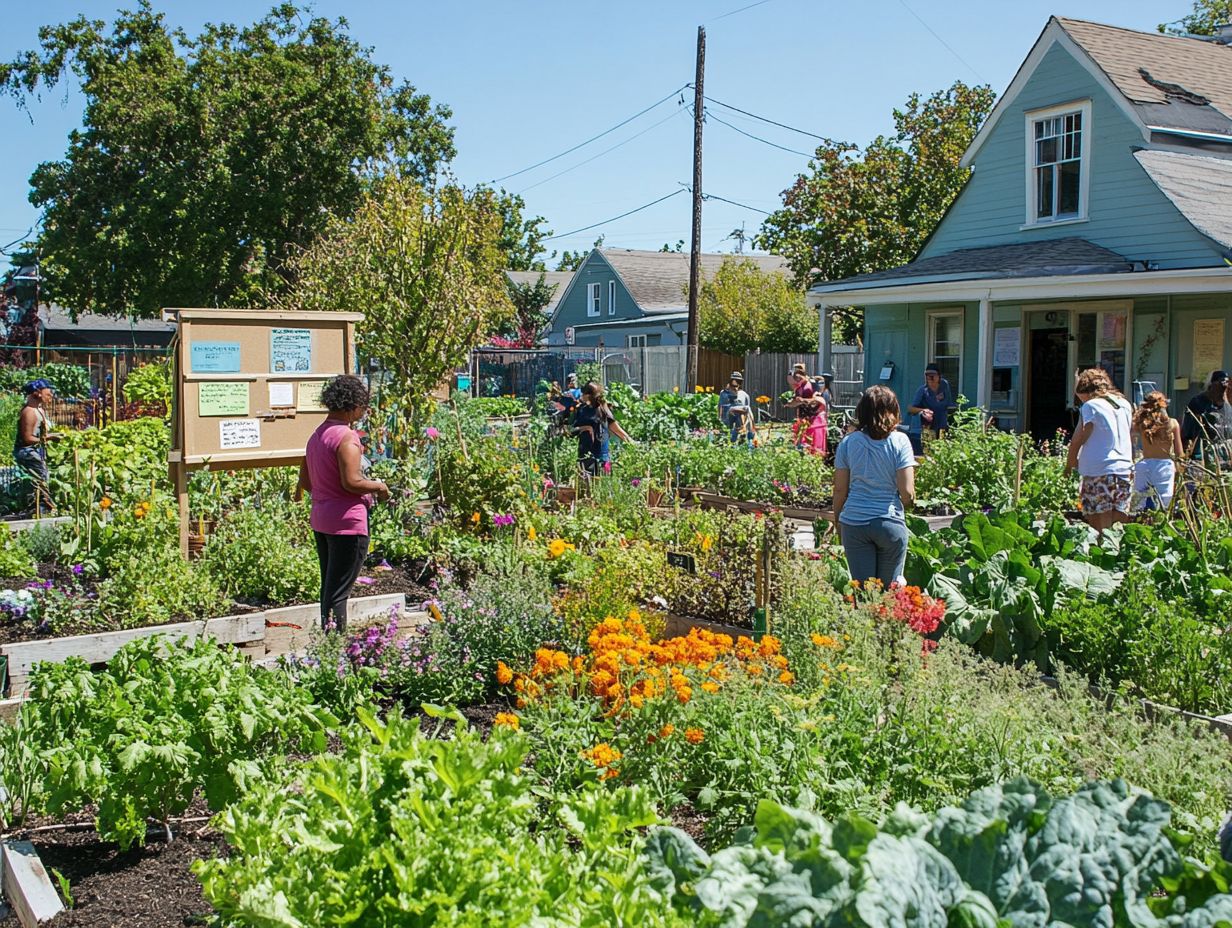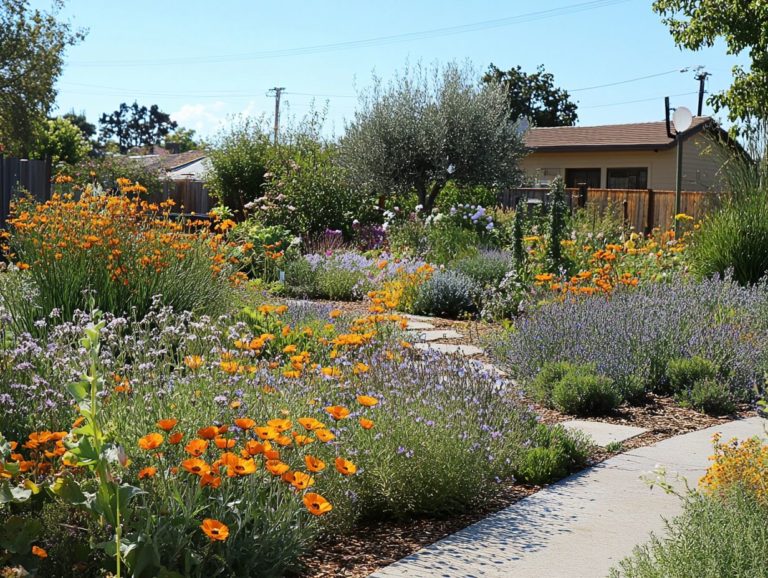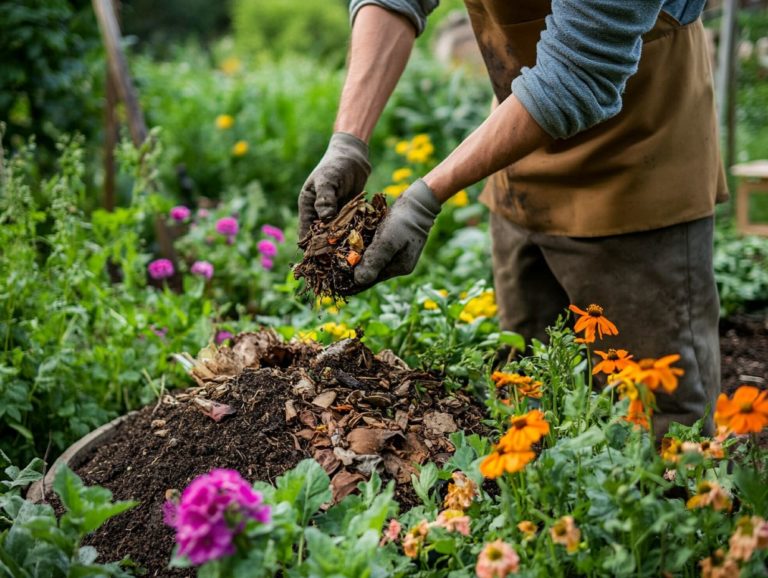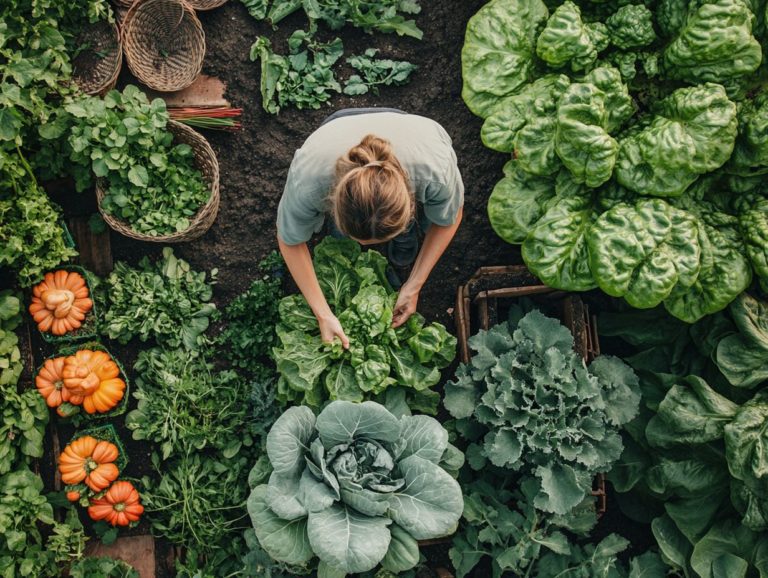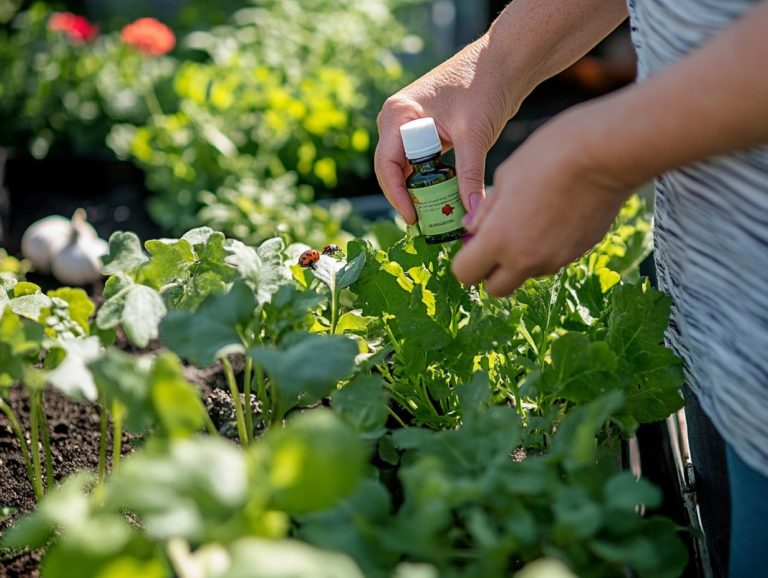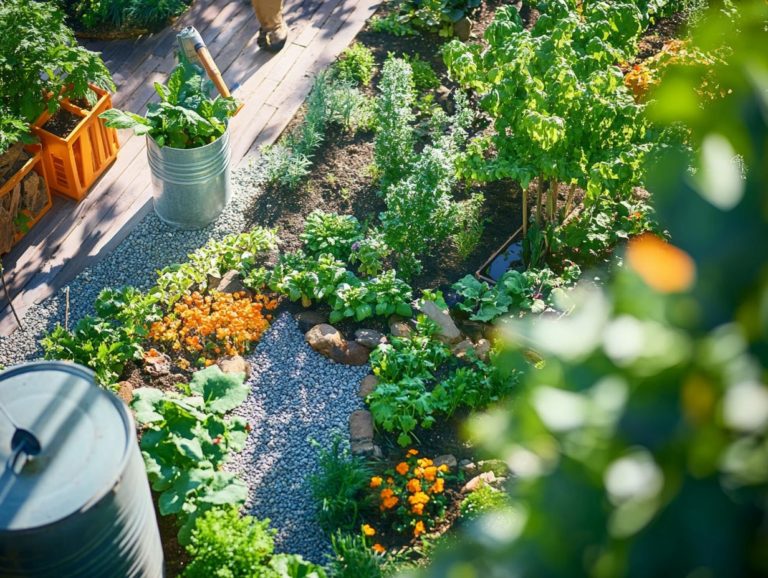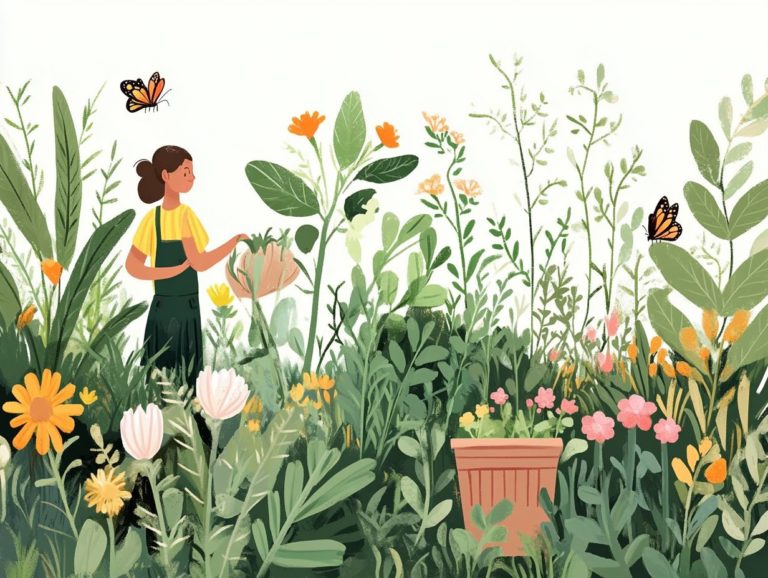What are the Best Community Resources for Gardening?
Community gardening has emerged as a flourishing movement that enriches urban landscapes and nurtures connections among neighbors.
This article will show you the amazing benefits of community gardening, highlighting its positive influence on social relationships and the environment, as well as its contributions to personal well-being.
Whether you’re eager to join a local garden or seeking tools and resources to elevate your gardening journey, you’ll find practical tips and insights here to help you cultivate a vibrant and thriving gardening community.
Contents
- Key Takeaways:
- Benefits of Community Gardening
- How to Get Involved in Community Gardening
- Joining a Community Gardening Group
- Types of Community Gardening Resources
- Tools and Equipment
- Education and Training
- Making the Most of Community Gardening Resources
- Frequently Asked Questions
- Is there a community garden near me that I can join?
- What kind of resources can I find at a community garden?
- Are there any volunteer opportunities at community gardens?
- Can I share my gardening knowledge and skills at a community garden?
- Are community gardens only for growing fruits and vegetables?
- Do I need to have a green thumb to participate in a community garden?
Key Takeaways:
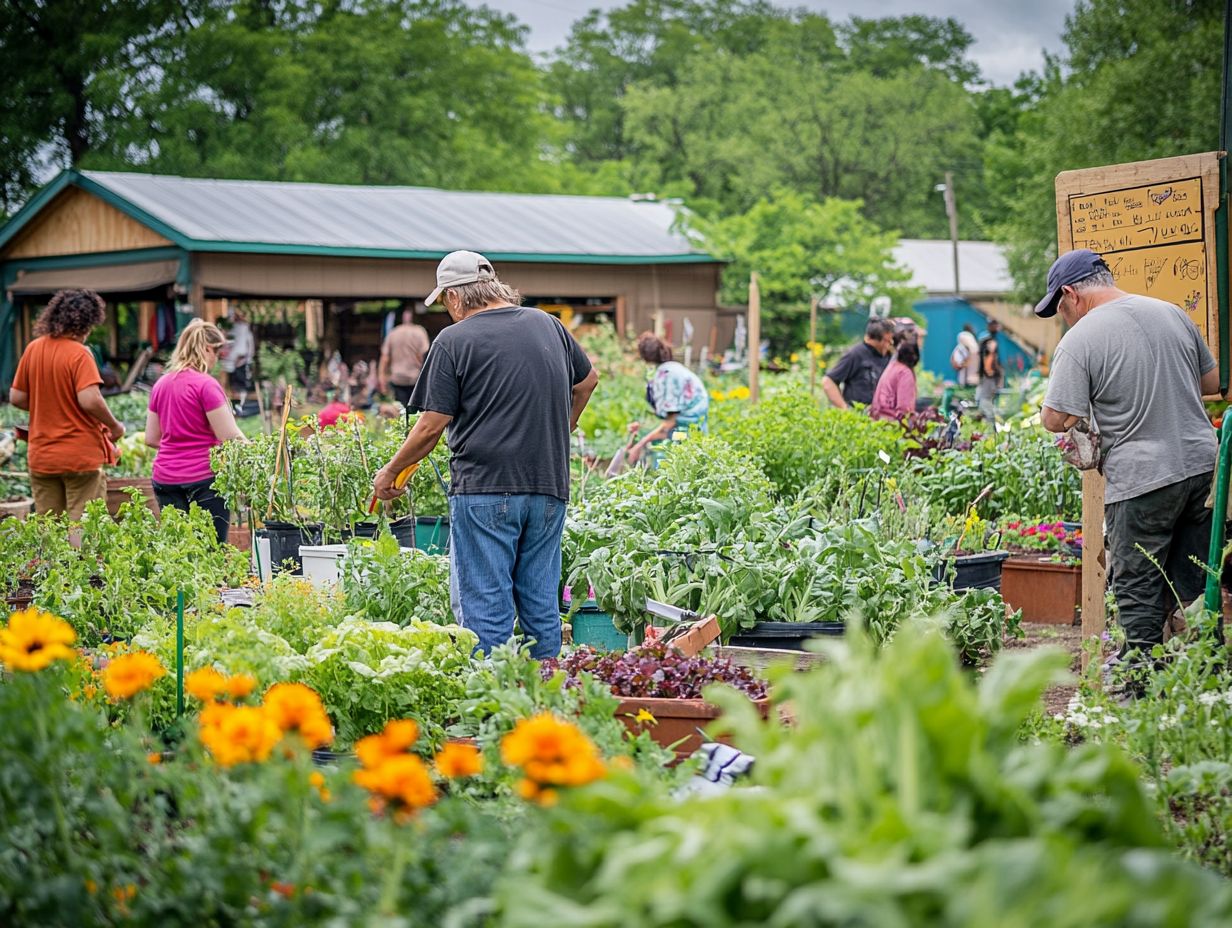
- Community gardening provides numerous benefits, including social connection, keeping the environment healthy, and improved health.
- To get involved, start by researching and locating a garden near you and joining a gardening group for support and resources.
- Community gardening resources include tools, education, training opportunities, and support networks to help maximize gardening benefits.
What is Community Gardening?
Community gardening is all about you and your neighbors coming together to cultivate land, often in urban settings. The goal is to enhance access to food, improve nutrition, and foster a sense of community. These gardens are vital sanctuaries for people who need extra help, offering spaces to engage in gardening projects, learn sustainable practices, and truly belong.
In recent years, the importance of these gardens has surged as more people recognize their role in keeping the environment healthy. They provide habitats for local wildlife, help reduce urban heat, improve air quality, and contribute to a more resilient ecosystem.
There are various types of community gardens educational, therapeutic, and production that cater to different needs, encouraging environmental stewardship and social engagement. Many registered community gardens partner with local governments and nonprofits, enhancing community well-being by offering educational workshops and promoting healthy eating.
This enables you and your neighbors to take ownership of your local food systems, creating a stronger, more vibrant community together.
Benefits of Community Gardening
Community gardening presents you with an array of benefits that go far beyond merely cultivating food. It profoundly influences your health, social interactions, and commitment to keeping the environment healthy. By participating in community gardens, you can enjoy enhanced nutrition through greater access to fresh produce while also encouraging physical activity among your peers.
The mental health advantages are significant; nurturing plants and connecting with a community can effectively reduce stress and elevate your mood. These gardens also play a crucial role in fostering social connections and community cohesion, acting as essential resources in the fight against food insecurity and promoting a sustainable lifestyle.
Join a local garden today to start reaping these benefits!
Social, Environmental, and Health Benefits
The social, environmental, and health benefits of community gardening are closely connected. These benefits create a tapestry of positive effects that resonate throughout individuals and communities.
As you engage in community gardens, your mental health may receive a delightful boost. Gardening provides therapeutic benefits and encourages physical activity, promoting a healthier lifestyle and enhancing your nutrition.
Community gardens are not merely patches of green; they serve as important places that bring neighbors together. Here, social interactions and collaborations flourish while contributing to environmental sustainability by increasing the variety of plants and animals and reducing food miles. Imagine transforming a neglected lot into a vibrant community garden! This not only brings people together but also creates a green oasis in your neighborhood.
Picture this: in a previously neglected urban area, a community garden can ignite a sense of pride among locals, inspiring beautification initiatives and community clean-up events. Participants often share heartfelt stories about how these gardens not only provide fresh produce but also cultivate a strong sense of belonging and purpose. One gardener expressed, “I ve met so many amazing people here; we are not just growing crops; we are cultivating friendships.”
Such narratives illuminate the significant impact community gardens can have on mental well-being and communal bonds, threading rich social connections within neighborhoods.
How to Get Involved in Community Gardening
Engaging in community gardening is not just a pastime; it s a transformative experience that enables you to contribute to local food systems while forging meaningful connections within your community.
You have a multitude of avenues to explore, from joining an established community gardening group and participating in volunteer programs to initiating your own community garden project.
Numerous local organizations offer invaluable gardening workshops, equipping you with essential knowledge and skills. Generally, membership fees are modest and cover vital costs and operational expenses.
You can also get support from gardening organizations, ensuring that your efforts blossom beautifully.
Finding a Community Garden Near You
Finding a community garden near you is easier than you think, thanks to the expanding network of community gardens and the resources provided by local municipalities. Many areas have embraced community-supported agriculture programs that help residents get fresh food directly from local farms through user-friendly online platforms and directories. You can easily reach out to community gardening organizations that compile comprehensive lists of registered community gardens, ensuring you have broad access and opportunities for participation.
If you’re looking for more localized information, a quick check with your city’s parks and recreation department can be incredibly beneficial, as they often maintain updated lists of community gardens. Websites like Facebook and Nextdoor also shine as excellent platforms for discovering neighborhood gardening initiatives and events. Venturing into surrounding areas can uncover hidden gems and expand your opportunities for collaboration.
Join a community garden today and watch your neighborhood bloom with life!
Joining a Community Gardening Group
Joining a community gardening group is a fantastic way to dive into gardening. You ll make great friends and strengthen community ties.
Most groups charge a small membership fee for maintaining the garden and providing resources, like access to workshops and tools.
You can volunteer in the garden and learn essential techniques from experienced members. This hands-on experience is invaluable.
Workshops cater to all skill levels. You can explore topics like sustainable practices, pest management, and seasonal planting.
Sharing resources like seeds and tools cuts costs and builds a sense of camaraderie. Gardening becomes a collective passion everyone can enjoy.
Types of Community Gardening Resources
Community gardening resources are not just varied; they are vital for success. This includes everything from tools and equipment to educational opportunities and support networks.
Access to the right gardening tools is crucial. Many community gardens provide tool rentals and shared resources, making gardening accessible for everyone.
Attending educational workshops will equip you with essential knowledge. Networking opportunities can connect you with larger organizations that offer valuable guidance and support.
Tools and Equipment
Access to the right gardening tools and equipment can profoundly influence the success of your gardening projects. It enables you to cultivate a diverse array of plants with ease.
Many community gardens offer tool rentals, allowing you to access essential gardening tools without the hassle of buying them all.
Maintenance services are also available to keep the garden in peak condition for everyone involved. You’ll find many gardens equipped with specialized tools like trowels and pruners.
Tool-sharing initiatives create a vibrant sense of community, allowing you to borrow and return equipment. This fosters collaboration and trust among fellow gardeners.
Regular maintenance of these tools is essential to ensure safety and effectiveness. Community partnerships often play a crucial role in organizing repair workshops.
These workshops not only fix your equipment but also teach valuable upkeep practices, enhancing your overall gardening experience and ensuring sustainable practices thrive within the community.
Education and Training
Education and training play a crucial role in community gardening, equipping you with the essential knowledge to cultivate food and sustain your garden.
Numerous local gardening organizations provide workshops that delve into topics like effective growing strategies and soil health to pest management. These programs are designed to be inclusive and accessible for all skill levels.
Many programs also offer seminars and online courses that explore techniques like vertical gardening and preserving traditional seeds to grow plants that are true to their ancestors.
Take Sarah, for example. After attending a workshop on organic pest control, she successfully tackled an infestation without harmful chemicals, significantly boosting her yields.
Then there’s Tom, who shared how the knowledge he gained transformed his backyard into a thriving vegetable garden, providing his family with fresh produce year-round.
Testimonials like these underscore how these learning opportunities can genuinely transform lives, instilling confidence and promoting sustainable practices.
Join a community gardening group today and start cultivating your green thumb!
Support and Networking
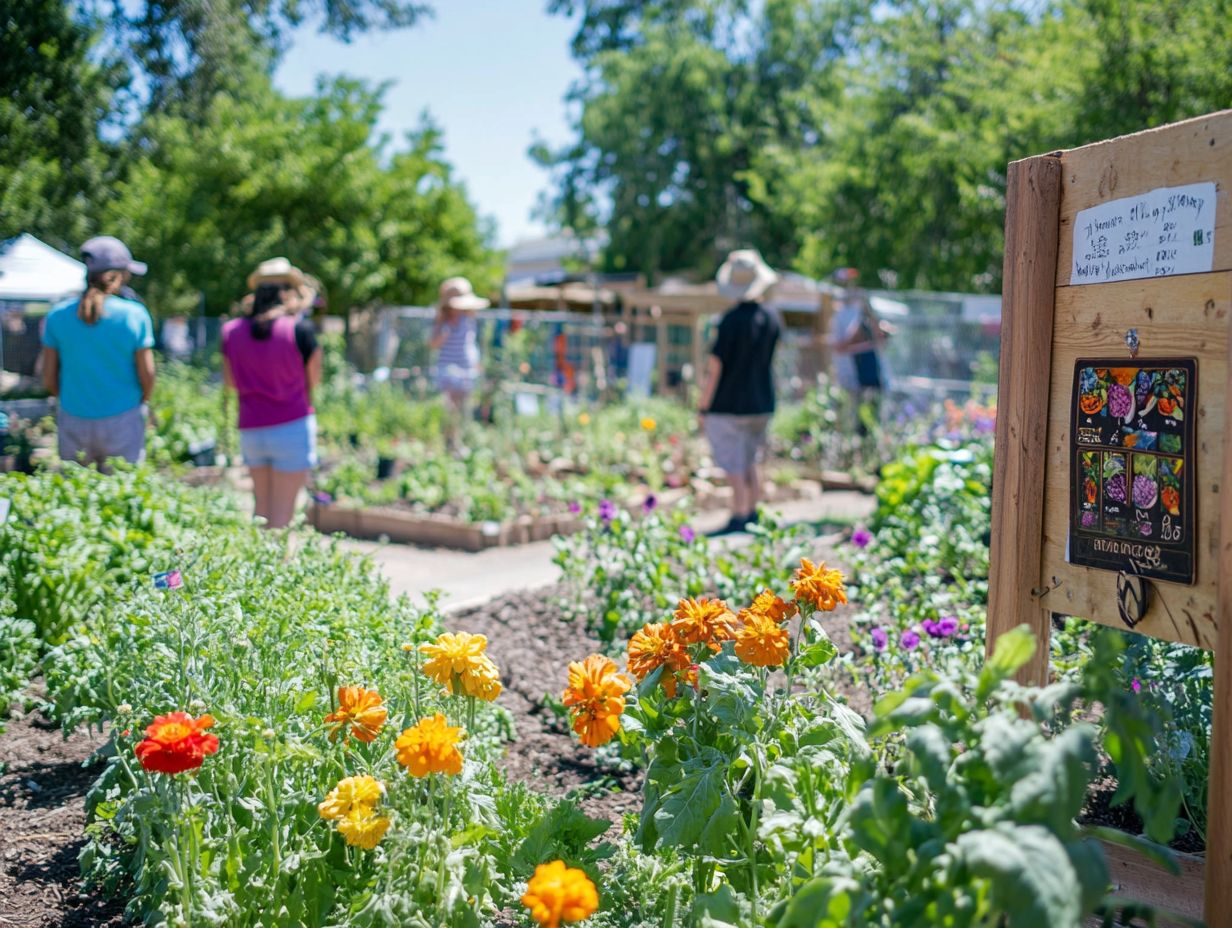
Support and networking opportunities are essential for the success of your community gardening initiatives. They connect you to vital resources and foster a profound sense of belonging. Local gardening organizations often provide guidance on best practices, funding options, and access to external resources.
Networking with other community gardens can facilitate food donations to local food banks, significantly enhancing your community’s health.
These collaborative efforts also strengthen access to healthy food by allowing gardens to share surplus produce. This not only reduces waste but ensures that fresh, nutritious food reaches those in need. Such interconnectedness promotes local partnerships, enabling you and fellow gardeners to learn from each other’s experiences and develop innovative solutions to challenges.
Ultimately, the impact of these networks goes beyond gardening. They help build community cohesion, unite diverse groups around a common cause, and cultivate a shared commitment to sustainable living and food justice.
Making the Most of Community Gardening Resources
To truly harness the potential of community gardening resources, take a proactive stance. Adopting effective growing strategies and fostering a culture of knowledge-sharing among members can help your community garden flourish and lead to collective success.
Regularly evaluating available resources and the needs of your community will optimize the use of tools, workshops, and support networks, ensuring everyone benefits from their gardening endeavors.
Tips for Maximizing Benefits and Resources
To maximize the advantages of community gardening, consider implementing a range of effective gardening strategies. These tactics not only boost your yield but also address critical issues like food insecurity and promote environmental sustainability. Regular communication about resource availability and gardening techniques is vital for fostering a collaborative atmosphere.
Sharing tools and seeds can dramatically cut costs and inspire experimentation among gardeners. Establishing a seasonal planting schedule allows you and your fellow participants to collectively choose crops, ensuring a diverse and continuous harvest.
Organizing regular workshops on topics such as pest management or composting can enhance everyone’s skills. Involving local schools or organizations in garden activities enriches the experience and strengthens community ties.
Collectively celebrating harvest days or potlucks cultivates a sense of belonging, creating a vibrant and supportive gardening culture that everyone can thrive in.
Frequently Asked Questions
Is there a community garden near me that I can join?
Yes, you can easily find community gardens near you by searching online or asking your local gardening center or city government. Many cities have dedicated websites or maps that list community gardens in the area.
What kind of resources can I find at a community garden?
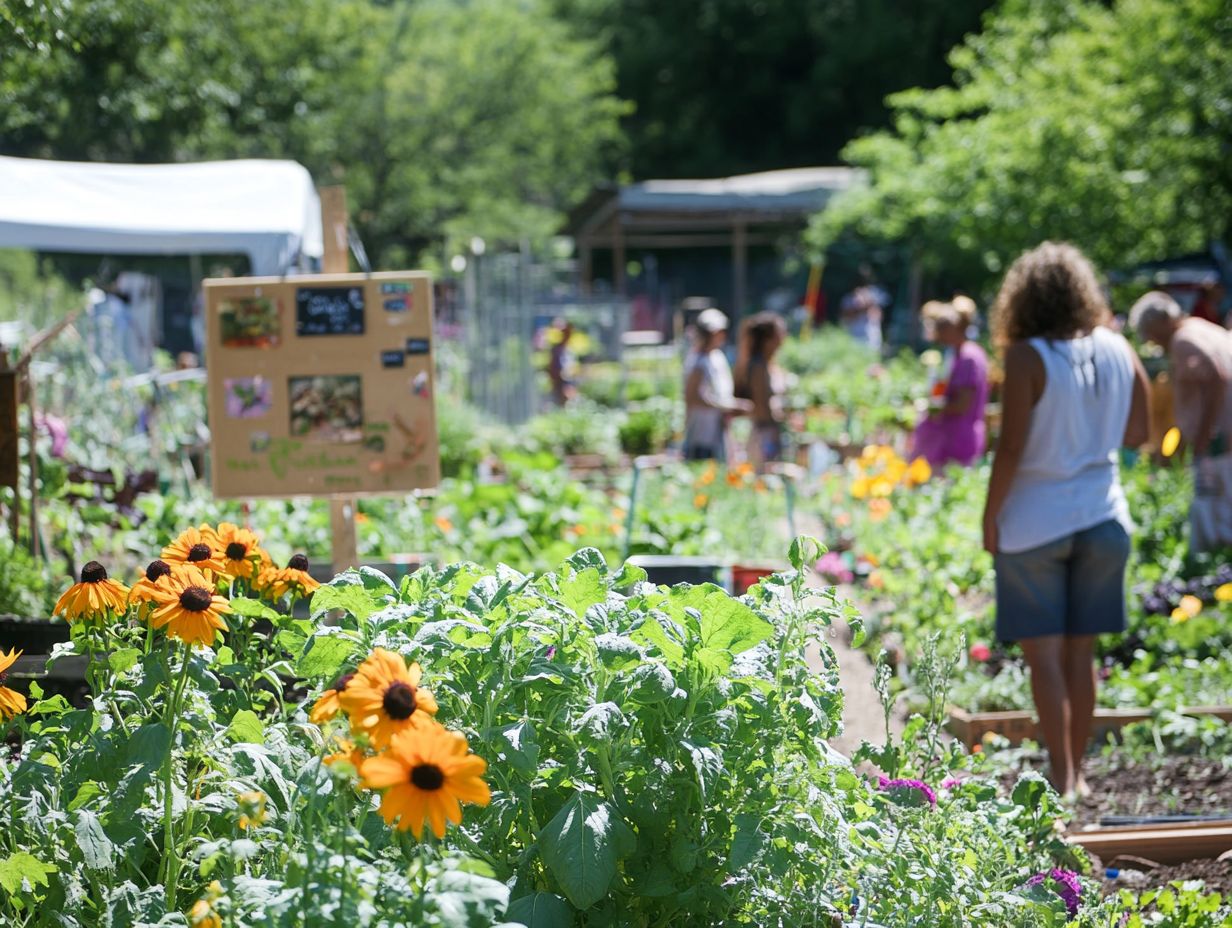
Community gardens often provide a variety of resources, such as tools, seeds, and gardening advice. Some may even offer classes or workshops on gardening techniques and sustainable practices.
Are there any volunteer opportunities at community gardens?
Yes, community gardens often rely on volunteers to help maintain the garden and assist with events or workshops. It’s a great way to get involved and learn more about gardening while giving back to your community.
Absolutely! Many community gardens welcome experienced gardeners to share their knowledge and skills with others. You can volunteer to lead a workshop or simply offer advice and guidance to fellow gardeners.
Are community gardens only for growing fruits and vegetables?
Absolutely! Community gardens are not just for fruits and vegetables. They can also include beautiful flowers and a variety of other plants.
Some gardens have specific areas for certain types of plants. Others embrace a delightful mix of fruits, vegetables, and decorative plants.
Do I need to have a green thumb to participate in a community garden?
No way! Community gardens welcome everyone, regardless of gardening experience.
It s a fantastic opportunity to learn and improve your skills. Plus, you ll connect with fellow gardening enthusiasts!

